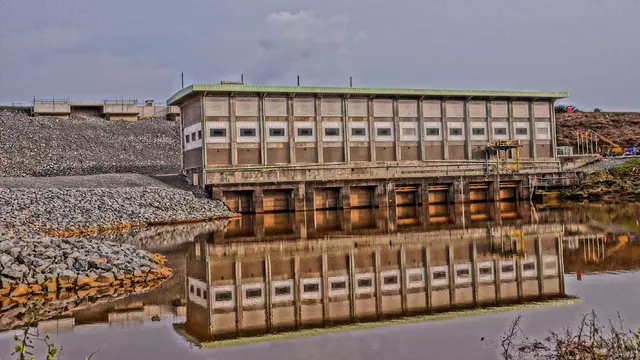
How the modernisation of the Mount Coffee power plant is advancing Liberia's development
For the people in and around Liberia's capital city of Monrovia, a stable electricity supply is part of everyday life nowadays. The economy can grow and the standard of living is improving. This has not always been the case. This development was launched by the modernisation of the Mount Coffee hydroelectric power station.
When the Liberian President Ellen Johnson Sirleaf celebrated the launch of the first construction phase of the Mount Coffee power plant with international guests on the 15th of December 2016, she knew that her country had taken a decisive step forward. For the capital city of Monrovia, the economic centre of the West African country, the power plant on the St. Paul River plays a key role. "One of the most important plants in the Liberian energy grid was rebuilt with the refurbishment of the Mount Coffee power plant," emphasises Sirleaf.
Built in the 1960s as the largest hydroelectric power station in the country of its time, it was severely damaged in the civil war (1989 - 2003). It really became a ruin when the electrical and mechanical components were devastated by looting. Only parts of the dam and the steel pressure pipes remained intact. This was a severe setback for the economic and social progress of the country. From 2006, Monrovia relied on expensive, non-renewable diesel power generation to meet its energy needs.
In order to improve the situation, the operator of the power plant, Liberia Electricity Corporation (LEC), embarked on a modernisation project: The financing of the major project was secured together with international partners, making it a flagship project for the African continent. It is not only the functionality of the power plant that is going to be restored during the course of the modernisation: An increase in output of around one third to a total of 88 MW will enable one million people to be supplied with clean and sustainable energy.




Modernisation under difficult conditions
With the modernisation, the digital age is making its way to the Mount Coffee hydroelectric power station - on a path paved with many obstacles. The limited infrastructure in the country and the equipment of the existing power plant in particular made it necessary to take many factors into account during the planning and installation.
Bad roads between the construction site and the port of Monrovia, which is located some 25 kilometres away, pose a challenge for the transportation of fragile equipment. In addition, work is disrupted by heavy rainfall from April to October - a carefully designed work plan allowed the entire supply chain to be managed during the dry season.
Not even unforeseen events such as the spread of the Ebola virus in 2014 and many malaria infections in the team were able to delay the restoration work, as construction site manager Franz Bayrle reports: "In 2016, we had 35 cases of malaria in my team alone. But the work in the multicultural team with members from Liberia, Pakistan, Indonesia, Germany, Norway and Sweden progressed well. I am very happy with them."
Minimal reconstruction for the highest technical requirements
Compared to the original 60-year-old design, the requirements for control systems and electrical equipment are much higher today. This is not unusual for a complete refurbishment and modernisation. The objective of using the existing structures without extensive modifications was achieved with Mount Coffee.
The existing space can be used more effectively thanks to 3D construction technology and close cooperation between the consulting engineers. The necessary conversion work on the building infrastructure was reduced to a minimum: only a few dozen cores had to be drilled and two new partitions erected in order to install the complete electronic system in line with the latest technology. Today, the modernised plant is equipped with a Voith automation system, digital controllers and a state-of-the-art control unit.

Investing in the future: training qualified workers
A team of local experts is indispensable to ensure the successful operation of the power plant for future generations. Knowledge transfer is therefore a central building block in the success story of the project. This is how important jobs are created for the local population.
At Voith HydroSchool™, employees of the Liberia Electricity Cooperation were trained in several stages for the operation and maintenance of the plant. Even during the construction work, they were provided with detailed technical knowledge and skills, which were taught in a curriculum especially tailored to the project.
While the mammoth project was given the finishing touches on site in autumn 2016, the first team of new LEC employees were already welcomed for training in Heidenheim. Here, they were given deeper insights into the Mount Coffee power plant, its machinery and functions. The participants felt well prepared for their future tasks: "All lessons were helpful for the OMT process of Mount Coffee".
Cherie Ferrari, Head of Customer Education and Training, is also satisfied: "This project is an excellent example of how a reliable power supply from hydropower in combination with qualified local technicians can really strengthen the economic and social structure of countries like Liberia".
With the support of Voith and its project partners, the local team will fulfill President Sirleaf's mission to provide Liberia with a reliable power supply.
Scope of services Mount Coffee
- Power unit: Francis turbines & generators
- Power plant crane
- Electrical equipment & control technology
Key technical data
- 4 vertical shaft Francis turbines
- 88 MW maximum plant capacity (increased from originally 64 MW)
- Total apparent power 108 MVA
- Drop height 23.1m
- Synchronous speed 142.86 rpm





